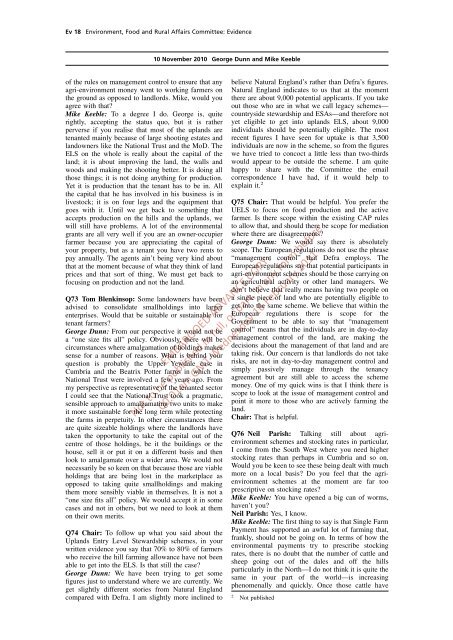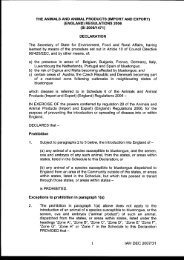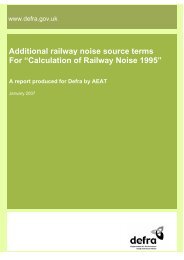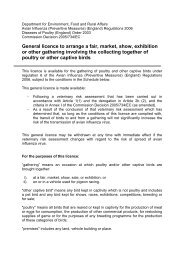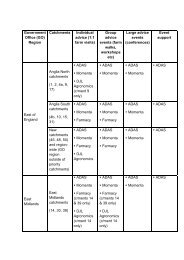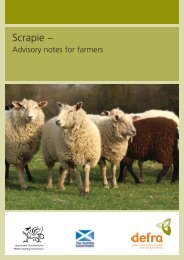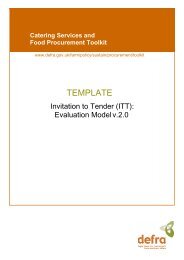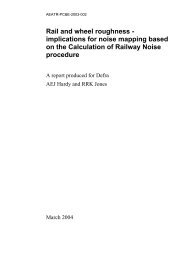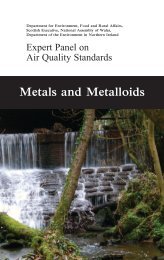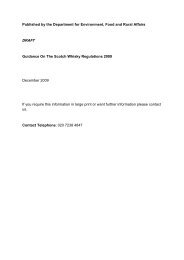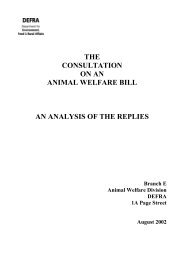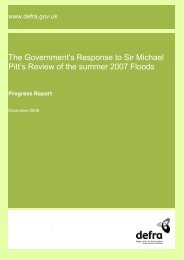Farming in the Uplands - ARCHIVE: Defra
Farming in the Uplands - ARCHIVE: Defra
Farming in the Uplands - ARCHIVE: Defra
Create successful ePaper yourself
Turn your PDF publications into a flip-book with our unique Google optimized e-Paper software.
Ev 18 Environment, Food and Rural Affairs Committee: Evidence<br />
of <strong>the</strong> rules on management control to ensure that any<br />
agri-environment money went to work<strong>in</strong>g farmers on<br />
<strong>the</strong> ground as opposed to landlords. Mike, would you<br />
agree with that?<br />
Mike Keeble: To a degree I do. George is, quite<br />
rightly, accept<strong>in</strong>g <strong>the</strong> status quo, but it is ra<strong>the</strong>r<br />
perverse if you realise that most of <strong>the</strong> uplands are<br />
tenanted ma<strong>in</strong>ly because of large shoot<strong>in</strong>g estates and<br />
landowners like <strong>the</strong> National Trust and <strong>the</strong> MoD. The<br />
ELS on <strong>the</strong> whole is really about <strong>the</strong> capital of <strong>the</strong><br />
land; it is about improv<strong>in</strong>g <strong>the</strong> land, <strong>the</strong> walls and<br />
woods and mak<strong>in</strong>g <strong>the</strong> shoot<strong>in</strong>g better. It is do<strong>in</strong>g all<br />
those th<strong>in</strong>gs; it is not do<strong>in</strong>g anyth<strong>in</strong>g for production.<br />
Yet it is production that <strong>the</strong> tenant has to be <strong>in</strong>. All<br />
<strong>the</strong> capital that he has <strong>in</strong>volved <strong>in</strong> his bus<strong>in</strong>ess is <strong>in</strong><br />
livestock; it is on four legs and <strong>the</strong> equipment that<br />
goes with it. Until we get back to someth<strong>in</strong>g that<br />
accepts production on <strong>the</strong> hills and <strong>the</strong> uplands, we<br />
will still have problems. A lot of <strong>the</strong> environmental<br />
grants are all very well if you are an owner-occupier<br />
farmer because you are appreciat<strong>in</strong>g <strong>the</strong> capital of<br />
your property, but as a tenant you have two rents to<br />
pay annually. The agents a<strong>in</strong>’t be<strong>in</strong>g very k<strong>in</strong>d about<br />
that at <strong>the</strong> moment because of what <strong>the</strong>y th<strong>in</strong>k of land<br />
prices and that sort of th<strong>in</strong>g. We must get back to<br />
focus<strong>in</strong>g on production and not <strong>the</strong> land.<br />
Q73 Tom Blenk<strong>in</strong>sop: Some landowners have been<br />
advised to consolidate smallhold<strong>in</strong>gs <strong>in</strong>to larger<br />
enterprises. Would that be suitable or susta<strong>in</strong>able for<br />
tenant farmers?<br />
George Dunn: From our perspective it would not be<br />
a “one size fits all” policy. Obviously, <strong>the</strong>re will be<br />
circumstances where amalgamation of hold<strong>in</strong>gs makes<br />
sense for a number of reasons. What is beh<strong>in</strong>d your<br />
question is probably <strong>the</strong> Upper Yewdale case <strong>in</strong><br />
Cumbria and <strong>the</strong> Beatrix Potter farms <strong>in</strong> which <strong>the</strong><br />
National Trust were <strong>in</strong>volved a few years ago. From<br />
my perspective as representative of <strong>the</strong> tenanted sector<br />
I could see that <strong>the</strong> National Trust took a pragmatic,<br />
sensible approach to amalgamat<strong>in</strong>g two units to make<br />
it more susta<strong>in</strong>able for <strong>the</strong> long term while protect<strong>in</strong>g<br />
<strong>the</strong> farms <strong>in</strong> perpetuity. In o<strong>the</strong>r circumstances <strong>the</strong>re<br />
are quite sizeable hold<strong>in</strong>gs where <strong>the</strong> landlords have<br />
taken <strong>the</strong> opportunity to take <strong>the</strong> capital out of <strong>the</strong><br />
centre of those hold<strong>in</strong>gs, be it <strong>the</strong> build<strong>in</strong>gs or <strong>the</strong><br />
house, sell it or put it on a different basis and <strong>the</strong>n<br />
look to amalgamate over a wider area. We would not<br />
necessarily be so keen on that because those are viable<br />
hold<strong>in</strong>gs that are be<strong>in</strong>g lost <strong>in</strong> <strong>the</strong> marketplace as<br />
opposed to tak<strong>in</strong>g quite smallhold<strong>in</strong>gs and mak<strong>in</strong>g<br />
<strong>the</strong>m more sensibly viable <strong>in</strong> <strong>the</strong>mselves. It is not a<br />
“one size fits all” policy. We would accept it <strong>in</strong> some<br />
cases and not <strong>in</strong> o<strong>the</strong>rs, but we need to look at <strong>the</strong>m<br />
on <strong>the</strong>ir own merits.<br />
Q74 Chair: To follow up what you said about <strong>the</strong><br />
<strong>Uplands</strong> Entry Level Stewardship schemes, <strong>in</strong> your<br />
written evidence you say that 70% to 80% of farmers<br />
who receive <strong>the</strong> hill farm<strong>in</strong>g allowance have not been<br />
able to get <strong>in</strong>to <strong>the</strong> ELS. Is that still <strong>the</strong> case?<br />
George Dunn: We have been try<strong>in</strong>g to get some<br />
figures just to understand where we are currently. We<br />
get slightly different stories from Natural England<br />
compared with <strong>Defra</strong>. I am slightly more <strong>in</strong>cl<strong>in</strong>ed to<br />
10 November 2010 George Dunn and Mike Keeble<br />
believe Natural England’s ra<strong>the</strong>r than <strong>Defra</strong>’s figures.<br />
Natural England <strong>in</strong>dicates to us that at <strong>the</strong> moment<br />
<strong>the</strong>re are about 9,000 potential applicants. If you take<br />
out those who are <strong>in</strong> what we call legacy schemes—<br />
countryside stewardship and ESAs—and <strong>the</strong>refore not<br />
yet eligible to get <strong>in</strong>to uplands ELS, about 9,000<br />
<strong>in</strong>dividuals should be potentially eligible. The most<br />
recent figures I have seen for uptake is that 3,500<br />
<strong>in</strong>dividuals are now <strong>in</strong> <strong>the</strong> scheme, so from <strong>the</strong> figures<br />
we have tried to concoct a little less than two-thirds<br />
would appear to be outside <strong>the</strong> scheme. I am quite<br />
happy to share with <strong>the</strong> Committee <strong>the</strong> email<br />
correspondence I have had, if it would help to<br />
expla<strong>in</strong> it. 2<br />
Q75 Chair: That would be helpful. You prefer <strong>the</strong><br />
UELS to focus on food production and <strong>the</strong> active<br />
farmer. Is <strong>the</strong>re scope with<strong>in</strong> <strong>the</strong> exist<strong>in</strong>g CAP rules<br />
to allow that, and should <strong>the</strong>re be scope for mediation<br />
where <strong>the</strong>re are disagreements?<br />
George Dunn: We would say <strong>the</strong>re is absolutely<br />
scope. The European regulations do not use <strong>the</strong> phrase<br />
“management control” that <strong>Defra</strong> employs. The<br />
European regulations say that potential participants <strong>in</strong><br />
agri-environment schemes should be those carry<strong>in</strong>g on<br />
an agricultural activity or o<strong>the</strong>r land managers. We<br />
don’t believe that really means hav<strong>in</strong>g two people on<br />
a s<strong>in</strong>gle piece of land who are potentially eligible to<br />
get <strong>in</strong>to <strong>the</strong> same scheme. We believe that with<strong>in</strong> <strong>the</strong><br />
European regulations <strong>the</strong>re is scope for <strong>the</strong><br />
Government to be able to say that “management<br />
control” means that <strong>the</strong> <strong>in</strong>dividuals are <strong>in</strong> day-to-day<br />
management control of <strong>the</strong> land, are mak<strong>in</strong>g <strong>the</strong><br />
decisions about <strong>the</strong> management of that land and are<br />
tak<strong>in</strong>g risk. Our concern is that landlords do not take<br />
risks, are not <strong>in</strong> day-to-day management control and<br />
simply passively manage through <strong>the</strong> tenancy<br />
agreement but are still able to access <strong>the</strong> scheme<br />
money. One of my quick w<strong>in</strong>s is that I th<strong>in</strong>k <strong>the</strong>re is<br />
scope to look at <strong>the</strong> issue of management control and<br />
po<strong>in</strong>t it more to those who are actively farm<strong>in</strong>g <strong>the</strong><br />
land.<br />
Chair: That is helpful.<br />
EMBARGOED ADVANCE COPY:<br />
Not to be published <strong>in</strong> full, or part, <strong>in</strong> any form before<br />
00.01am GMT Wednesday 16 February 2011<br />
Q76 Neil Parish: Talk<strong>in</strong>g still about agrienvironment<br />
schemes and stock<strong>in</strong>g rates <strong>in</strong> particular,<br />
I come from <strong>the</strong> South West where you need higher<br />
stock<strong>in</strong>g rates than perhaps <strong>in</strong> Cumbria and so on.<br />
Would you be keen to see <strong>the</strong>se be<strong>in</strong>g dealt with much<br />
more on a local basis? Do you feel that <strong>the</strong> agrienvironment<br />
schemes at <strong>the</strong> moment are far too<br />
prescriptive on stock<strong>in</strong>g rates?<br />
Mike Keeble: You have opened a big can of worms,<br />
haven’t you?<br />
Neil Parish: Yes, I know.<br />
Mike Keeble: The first th<strong>in</strong>g to say is that S<strong>in</strong>gle Farm<br />
Payment has supported an awful lot of farm<strong>in</strong>g that,<br />
frankly, should not be go<strong>in</strong>g on. In terms of how <strong>the</strong><br />
environmental payments try to prescribe stock<strong>in</strong>g<br />
rates, <strong>the</strong>re is no doubt that <strong>the</strong> number of cattle and<br />
sheep go<strong>in</strong>g out of <strong>the</strong> dales and off <strong>the</strong> hills<br />
particularly <strong>in</strong> <strong>the</strong> North—I do not th<strong>in</strong>k it is quite <strong>the</strong><br />
same <strong>in</strong> your part of <strong>the</strong> world—is <strong>in</strong>creas<strong>in</strong>g<br />
phenomenally and quickly. Once those cattle have<br />
2 Not published


